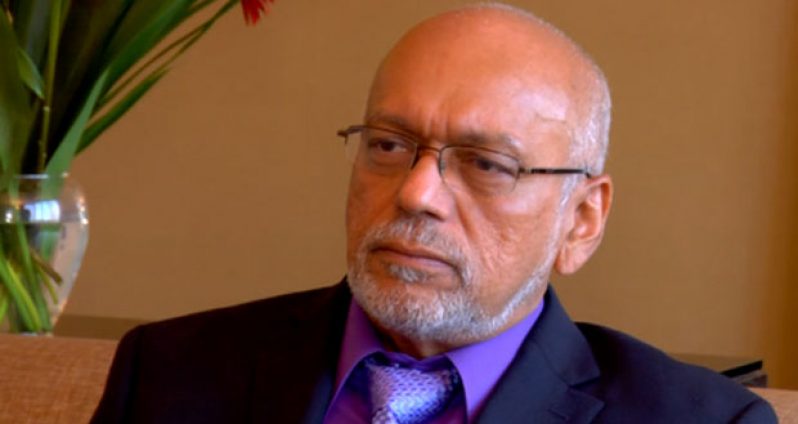AMID THE rising tempo for this month’s carnival in Trinidad and Tobago, ‘Trinis’ are also much energised in a guessing game over new general elections that could well occur within the next three months.
It would be one of five national elections within CARICOM, among them Guyana’s, as scheduled for May 11. This could well turn out to be primarily a fierce contest between the incumbent People’s Progressive Party/Civic and the main People’s National Congress, the latter still under the umbrella of what had emerged for the 2011 poll as A Partnership for National Unity (APNU).
New parliamentary elections in Trinidad and Tobago for the 41-member House of Representatives–in which Prime Minister, Kamla Persad Bissessar’s People’s Partnership Government has an overwhelming majority– is constitutionally due not later than September.

However, speculations of an early poll have been generated by an unprecedented major restructuring of her cabinet by the Prime Minister last Monday.
Within CARICOM, Persad-Bissessar happens to be one of two women Prime Ministers who also leads a ruling party, the other being Jamaica’s Portia Simpson-Miller.
In what some commentators view as a political blood-spattering event, she dismissed her high profile Attorney General as well as the Minister of National Security last Monday among six of her ministerial colleagues.
First of the five national elections expected during this year is that of St. Kitts and Nevis and takes place this February 16, while the Trinidad and Tobago Prime Minister has seemingly opted to roll out her electioneering campaign with last Monday’s sensational pre-carnival, pre-election cabinet reshuffle.
The dramatic cabinet changes have occurred against the backdrop of quite disturbing allegations of ministerial involvement in “witness tampering” and may well have been unique in the country’s 52-year history of political independence.
Both the Attorney General (Anand Ramlogan) and National Security Minister (Gary Griffith) were among the victims of what the ‘Trinidad Express’ headlined in its lead story as “Kamla’s Ole Mas”, perhaps reflecting the current carnival mood.
At the core of the sensational outbursts that led to Monday’s cabinet reshuffle, and with new general elections looming for May, is the alleged involvement of the Attorney General seeking to influence Director of the Police Complaints Authority, David West, to withdraw a statement he had submitted involving the case against two leading Trinidadian businessmen contesting their extradition to the USA.

Focus on PAC Director
Having dismissed both the Attorney General and the Minister of National Security, the Prime Minister also declared in a special broadcast that she was now requesting the President of the Republic to rescind the appointment of West as Director of the PAC. This is currently the focus of diverse public opinion for and against the PAC chairman.
The basis for this request is that the PAC Director may have politically compromised his office by information shared with Opposition Leader of the People’s National Movement, Dr. Keith Rowley, a development currently in the public domain.
Meanwhile, as the T&T Prime Minister mulls her strategy for new elections within the first half of this year for the 41-member House of Representatives in which her coalition government controls 29 of the seats, with her own United National Congress having the single largest majority—elections are also being planned for other CARICOM states in coming months.
St. Kitts-Nevis and Guyana polls
Apart from that scheduled for this February 16 in St. Kitts and Nevis, elections campaigning are also underway in Guyana for May 11 and later in St. Vincent and the Grenadines.
In contrast to a “unity coalition” by opposition forces in St. Kitts and Nevis, where Prime Minister Dr. Denzil Douglas is seeking a fifth consecutive term, across in Guyana the Opposition parties—A Partnership for National Unity (APNU) and Alliance For Change (AFC)—remain divided.
The two have repeatedly failed to reach an accord on the modalities of a common front against the governing People’s Progressive Party/Civic (PPP/C), which is also aiming at a consecutive fifth five-year term.
In St Kitts and Nevis, a major challenge confronting Prime Minister Douglas Labour Party’s bid for a successive fifth term is his recent move to controversially push ahead with plans for changing electoral boundaries.
His opponents, in what’s known as ‘Team Unity’ for the February 16 poll, moved to the courts to block the rushed arrangement to reshape the electoral boundaries. But the St. Lucia-based Eastern Caribbean Supreme Court late last week ruled in favour of the Government to proceed with the boundary changes.
Meanwhile, here in Guyana, the main Opposition PNC, which controls the alliance known as APNU, is now openly declaring its disappointment with the minority AFC to forge an envisaged anti-PPP front at the coming May 11 poll for the 65-member House of Assembly.
The President of Guyana, Donald Ramotar, felt compelled to prorogue Parliament last November in the face of recurring non-cooperation from the Opposition coalition in the National Assembly, where the PPP had a minority of one. New elections were not constitutionally due before November 2016.
The failure by the combined Opposition to form an anti-PPP election front has resulted from lingering internal divisions and is now viewed as a further confidence booster for the governing party.
Analysis by
Rickey Singh
(Rickey Singh is a noted Barbados-based Caribbean journalist)




.jpg)









